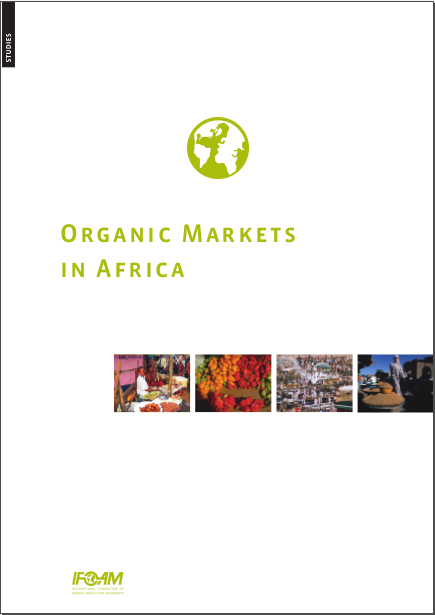
ตลาดออร์แกนิคในแอฟริกาส่วนใหญ่ยังอยู่ในขั้นเริ่มต้น ยกเว้นในประเทศแอฟริกาใต้และอียิปต์ ผู้ผลิตและผู้ประกอบการออร์แกนิคในแอฟริกาส่วนใหญ่จะทำตลาดส่งออกเป็นหลักมากกว่าตลาดในประเทศ เพราะตลาดในต่างประเทศมีขนาดใหญ่กว่ามาก อย่างไรก็ดี ตลาดออร์แกนิคที่เพิ่งเริ่มเกิดขึ้นในแอฟริกามักจะเป็น (ก) ร้านออร์แกนิคที่เปิดขึ้นโดยผู้ประกอบการค้าเอกชน และ (ข) การเปิดตลาดนัดที่เกษตรกรนำผลผลิตมาขายให้ผู้บริโภคโดยตรง ซึ่งตลาดนัดนี้มักจะริเริ่มขึ้นโดยองค์กรพัฒนาเอกชน ที่ทำงานพัฒนาและส่งเสริมเกษตรอินทรีย์
ปัจจัยท้าทายของตลาดออร์แกนิคในแอฟริกาประกอบด้วย ความสม่ำเสมอของการผลิต, ความต้องการซื้อที่ยังน้อยอยู่, การจัดการห่วงโซ่ผลผลิตที่ยังค่อนข้างอ่อนแอ รวมไปถึงไม่มีผู้ประกอบเอกชนที่สนใจที่จะลงทุนในการทำตลาดในประเทศมากนัก แต่ขณะเดียวกัน ก็มีจุดแข็งอยู่บ้าง โดยเฉพาะผู้ประกอบการส่งออกที่มีการจัดการห่วงโซ่ผลผลิตที่ค่อนข้างดีอยู่แล้ว แนวทางหลักในการขับเคลื่อนตลาดออร์แกนิคในแอฟริกาแนวทางหนึ่งก็คือ การผลักดันให้เกิดเครือข่ายกลางเกษตรอินทรีย์ที่เป็นที่ยอมรับในหมู่ผู้ผลิตและผู้ประกอบการในแต่ละประเทศ เพื่อทำหน้าที่เป็นเวทีกลางในการสื่อสาร แลกเปลี่ยนข้อมูล และทำงานร่วมกันของผู้มีส่วนเกี่ยวข้อง โดยเฉพาะผู้ซื้อและผู้ขาย
This report is based on a survey of eighty-five local market initiatives, case studies of a handful of the initiatives, the market strategies of the National Organic Agriculture Movement (NOAM), the consultants’ experiences and a literature review.
Organic markets in Africa are still in their infancy except in South Africa and Egypt. In most countries exports are much bigger than domestic sales. However there are a number of initiatives, mainly in two categories:
– Organic shops and other outlets operated by private entrepreneurs
– NGO-driven initiatives to link farmers to markets
Key challenges are a lack of reliable supply, lack of demand, deficient supply chains and a lack of business interest. Key strengths are the engaged people and the existence of an organic export sector with good supply capacity. Many African countries don’t have a unified national organic movement. Such a movement can be pivotal for the development of domestic markets, as it provides a neutral platform for the sector to cooperate and communicate with stakeholders, including buyers and consumers.
The role of NGOs in the marketing is not without problems, and NGOs should be careful not to take over the roles of other market actors, be they farmers, traders or retailers. However, where the market is weak and the sector badly developed, NGOs do have a role to play for market information, market links, training of the actors in the value chain, and promotion.



